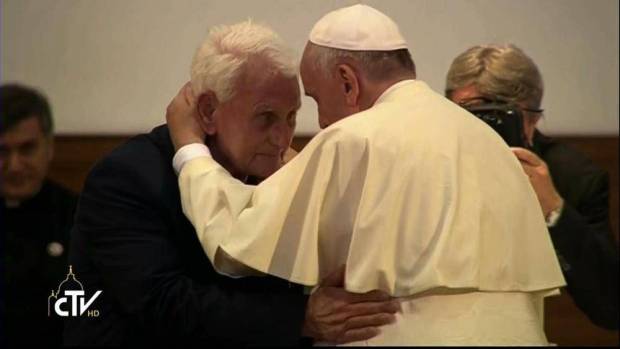Lenten Campaign 2025
This content is free of charge, as are all our articles.
Support us with a donation that is tax-deductible and enable us to continue to reach millions of readers.
“I have fond memories of my meeting with His Beatitude on my first Apostolic Journey outside of Italy,” writes Pope Francis in a message of condolence issued on January 29, 2025, following the death at 95 of Metropolitan Anastasius, who had guided the Orthodox Church in Albania for more than three decades. He welcomed Pope Francis during his visit to Tirana on September 21, 2014. “I cherish the fraternal embrace and words exchanged on that occasion,” writes the head of the Catholic Church.
“The faith of the Orthodox community of Albania was certainly embodied in the life of our dear brother, whose zealous pastoral service helped the people rediscover its richness and beauty following the years of state-imposed atheism and persecution,” Francis says in this warm message addressed to the clerics, religious, and faithful of “the beloved Orthodox Church of Albania.”
A leader who rebuilt Orthodoxy in Albania
“When assuming the responsibility of guiding the Orthodox Church in Albania, he desired to enter deeply into the hearts of those entrusted to his care, especially their traditions and identity, without ever losing communion with the other Orthodox Churches,” Pope Francis writes.
Comparing him to St. Paul, the pontiff pays tribute to his “fervent desire to live with his people and bear witness to the love of God, which overcomes all darkness and oppression, in the midst of those who had suffered greatly.”
It also underlines the commitment of the man who was President of the World Council of Churches from 2006 to 2013 to “peaceful coexistence with other Churches and religions.”
Metropolitan Anastasius was born in Greece in 1929. After a dynamic missionary life in Africa, he was sent to Albania by Patriarch Bartholomew of Constantinople as soon as the country opened up after the fall of the regime in January 1991. First with the title of Patriarchal Exarch, then as Archbishop of Tirana and all of Albania from 1992, he gradually reconstituted an Orthodox Church that the Communist government had sought to liquidate.
In Albania, persecution as an impulse for interreligious dialogue
In his message, Pope Francis indicates that his trip to Albania was his first “outside Italy,” but it was more precisely his first trip to Europe, having previously visited Brazil, the Holy Land, and South Korea. The choice of Albania, a country that is often ignored and not a member of the European Union, symbolized the Pope's preference for small, peripheral nations.
In a country marked by persecution under the atheist regime of Enver Hoxha, Pope Francis highlighted the fraternal relations between Catholics, Orthodox, and Muslims, who sometimes shared prison cells during the Communist era.
Two years after this trip, he elevated to the cardinalate one of the few Catholic priests to have survived persecution, Fr. Ernest Simoni, who was repeatedly sentenced to death but survived nearly three decades in prison.
Below, the Pope embraces the priest, and then later, greets him as a cardinal.












